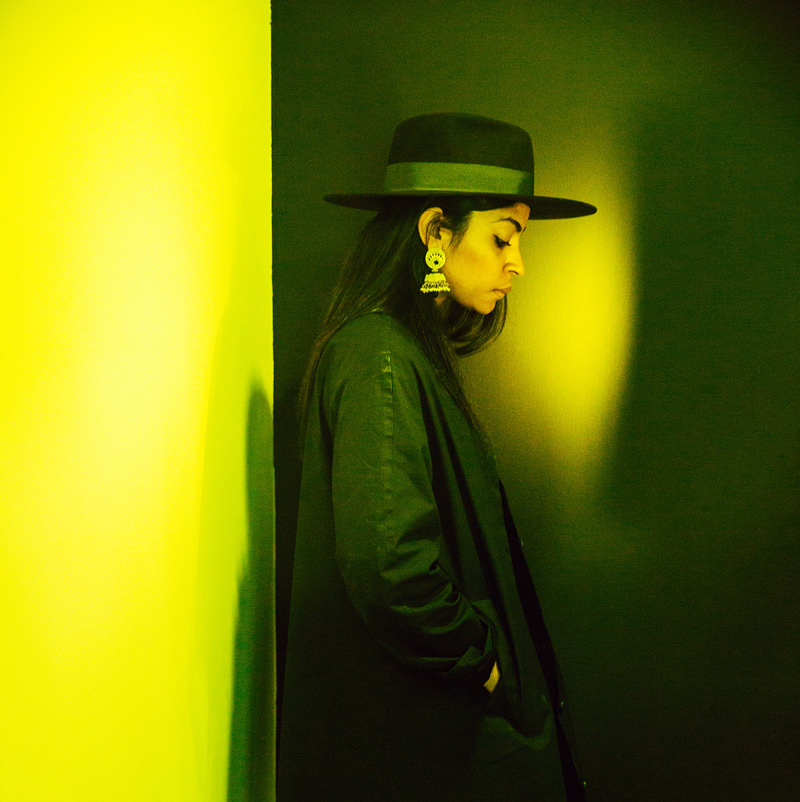Since it emerged from the desert only a few decades ago, Dubai has developed a reputation for sleek skyscrapers and unimaginable luxury. But for Kenyan-born filmmaker and photographer Amirah Tajdin, her adopted home offers something a little more nuanced. In her short film Baqala she explores the bodegas and their regulars, and reveals a very different city. Awash in a neon glow, her subjects feel like they’re from another, much quieter, planet. We caught up with her to talk about the contrasting realities of old and new Dubai, and how growing up in the Gulf shaped the way she experiences and films the city.
Dubai is often presented as a very fantastical place, it almost doesn’t feel real. But what was it like growing up there?
I was 14 when we moved to Dubai from Nairobi so it was a very different time, before the glitz and the shine and the big buildings. Because of my own Omani heritage and having lived in Muscat in the 90s, it was a familiar place to me. At that time, Dubai was changing — it was just at the tipping point. That’s when I came in and formed an identity for myself that was obviously still in transition as a teenager, but it’s a city that I owe a lot to in that sense. It’s such a transient place and there are people from everywhere, living between worlds, so Dubai allows you that space to have those conversations that you might not have in different cities.
You mentioned the glitz, but Baqala stays very far away from that. Why did you want to present it in this way?
Baqala came out of a high school friendship: one of my oldest friends is one of the founders of Sole DXB, a regional lifestyle platform for fashion, culture, and art. We’ve been long-time collaborators and for their 2015 edition, the guys came to me with a brief that focused on the city’s corner stores the baqalas. There are Dubai’s versions of a bodega, these old cute corner stores scattered around the city.
I came up with this sort of dreamy take on the baqala and what this cultural piece of the gulf region stands for to most of us who grew up in and around this region. In a way it’s increasingly becoming my style to blur the real world with a cinematic dreamy play. We shot the film in one night. Dubai is a city I love to show at night because of all the neon — I love filming neon.
Is your work still inspired by the Dubai of 15 years ago when you first moved here?
Oh definitely. Baqala was about capturing that nostalgia. Between Muscat in the early 90s and Dubai in the early 2000s, it was a different feel. You’d go to the baqala with your friends and pick up your juice box, chips, and bubble gum. It’s actually why I put bubble gum in the film. For me, bubble gum holds that memory of this region, of the desert, of the Gulf. Baqala was my ode to my old world and my personal love affair with this city.
Do you think people misinterpret or misunderstand Dubai?
We are a generation who get to live in a world where a new city is being built from scratch. People forget that Dubai is only 40 years old. No mega metropolis knew its identity at 40 years old. We previously all came from places that are old cities — that have already-grown identities and have a social and cultural fabric. Dubai’s fabric is just starting to be formed. It’s fascinating that we get to be a part of this conversation. As transient as it is for some of us — everyone’s “just here for a bit” — but even in those bits you make your mark, you take something from it.
What inspires you about Dubai?
I choose to live in the old part of the city because it gives me a sense of home, identity, and the past but it’s still in this shiny building. I try to strike a balance when I show Dubai. A theme in my work is juxtaposition and I think right now Dubai lends itself perfectly to that — there’s the contrast of old world and new world. Another thing I like doing here is riding the metro — you feel like you are on the set of a sci-fi film. You’re sitting there with people from all over the world, from all economic backgrounds and it’s a great way to see the city. I get a lot of inspiration when I’m on the metro. Dubai is a city that is re-writing how people of color are portrayed and I’m happy to be a part of that. It’s about breaking down cliches that have been out there for centuries. That’s inspiring.
Credits
Text Amna Qureshi
